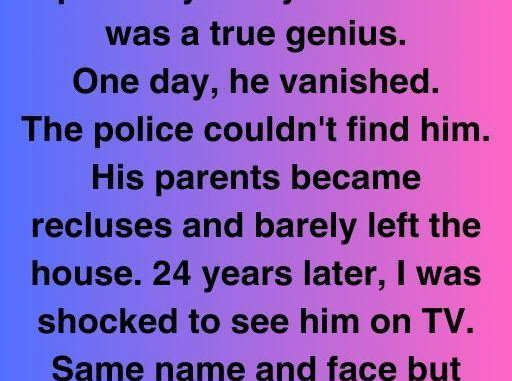
When I was 14, there was a remarkably quiet and bright boy in my class. Then one day, he simply disappeared. The police searched everywhere—forests, rivers, abandoned buildings—but found nothing. His parents withdrew from the world, rarely leaving home. Decades later, I was stunned to see him on television, older but unmistakable, announcing a groundbreaking software in San Francisco after winning a major tech award. His name was Theo Marcu.
In middle school, Theo had been painfully shy, often keeping his head down and speaking little. Teachers whispered he might be a future Einstein, excelling effortlessly at every subject. Then, without warning, he vanished. Rumors swirled: had he run away, been abducted, or something worse? The mystery haunted our small Romanian village for years.
His parents’ lives were never the same. His mother disappeared after volunteering at school; his father grew pale and withdrawn, smoking silently on the porch. Meanwhile, life pulled me away too, and I never expected to see Theo again—until that televised moment.
His speech shocked me. He explained he had been “concealed, trained, pushed” rather than nurtured, a statement that felt more literal than metaphorical. Determined to understand, I dug into his past. Online, his presence was minimal—no LinkedIn, vague interviews, no childhood photos. It appeared he had been “privately educated abroad.”
I contacted Radu, a former classmate still in our hometown. He finally revealed that, before Theo disappeared, a few classmates teased him—minor pranks, hiding books, whispering—but one day, Theo’s absence left their math teacher pale and frightened. Rumors were never fully explained.
Radu confided that he believed Theo had been taken—by an uncle no one knew existed. The mysterious man, nicknamed “the crow” by locals, appeared in a black car wearing gloves and a suit, never interacting with anyone but always present.
Visiting Theo’s old home years later, I discovered notebooks filled with his calculations, designs, and app ideas—accompanied by letters from his uncle. The letters were cold but precise, promising to cultivate Theo’s genius in isolation. Theo had been secluded in Austria, educated day and night, with no friends and no play, until he turned 18. Only then did he escape, slowly reclaiming the intellectual property and creations his uncle had controlled.
Despite the trauma, Theo rebuilt his life, legally reclaiming his work, and rose as a tech innovator. Yet, he carried guilt over the years of manipulation and isolation. I wrote to him, reminding him of his kind and gentle nature as a child, reassuring him that he owed no one anything. He responded gratefully, finally ready to reconnect with his past.
Theo returned quietly to our town, renovating his parents’ home and sharing knowledge with local children. He invited our old classmates to a riverside picnic, sharing a heartfelt lesson: brilliance alone is not enough; life revolves around human connection, choices, and recovery.
Over time, Theo quietly gave back, funding a library in honor of learning and love. His uncle, Victor Marcu, was eventually arrested for fraud and intellectual theft affecting multiple young geniuses. Theo’s story, labeled “the silent genius who saved a generation” by the media, reminded everyone in our village that even those who vanish—physically, emotionally, or spiritually—can return and inspire others.
The lesson is simple: never give up on someone who disappears. Healing is possible, and when they come back, they can rebuild not only their own life but the lives of others.